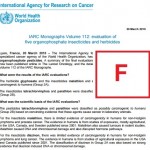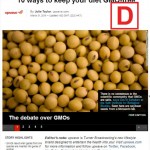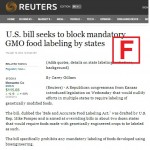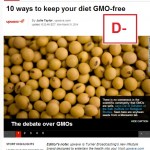As a public-sector research scientist, it was expected and a requirement of my position at the University of Illinois that I collaborate with and solicit the engagement of those working in my field of expertise. University and private sector collaborations are critically essential to ensure the public benefits from the best and most complete understanding of research and emerging commercial developments of any technology.
Sitemap
Site Feeds
Pages
- Home
- Wall of fame
- About
- Individuals
- Content
- Am Journ of Plant Science – Botta G, et al Review
- Dr. Oz Show on GM Foods: Introduction
- Dr. Oz interview with Stonyfield Organic CEO Gary Hirshberg & Dr. Alison Van Eenennaam
- Dr. Oz Show Presentation
- Dr. Oz Interview with Jeffrey Smith
- Dr. Oz Interview with Robin Bernhoft
- Dr. Oz Show on the Seralini rat study claims
- Dr. Oz Interview with Dr. Martina McGloughlin
- Dr. Oz Conclusion – How to avoid GMOs
- Genetic Roulette
- Section 1—Top 20 Urban Myths about GM Grops
- 1.1—Pusztai’s Flawed Claims
- 1.2—GM Tomatoes Proven Safe
- 1.3—Bt Corn Statistics Don’t Lie
- 1.4—These aren’t even GM Potatoes!
- 1.5—Bt Cotton is Safer for workers than pesticides
- 1.6—Bt Cotton is Safer for sheep than pesticides
- 1.7—No evidence that pollen causes disease
- 1.8—Mycotoxins cause reproductive failure
- 1.9—A classic logical fallacy about Bt corn
- 1.10—Rats fed Roundup Ready Soy – no effect on liver
- 1.11— Rats fed Roundup Ready Soy —no effect on pancreas
- 1.12— Rats fed Roundup Ready Soy —no effect on testicular cells
- 1.13—Rabbits can eat Roundup Ready Soy too
- 1.14—Ermakova’s findings defy logic
- 1.15—Eating soybeans increases soybean-specific IgG antibodies
- 1.16—Rats fed Roundup Ready Canola have healthy livers
- 1.17—Fast growing birds can eat Liberty-Link Corn
- 1.18—GM Peas Are discontinued
- 1.19—Animals Graze Where There’s Feed
- 1.20—High Doses of Tryptophan Cause EM
- Section 2—The Devil is in the DNA
- 2.1—Any DNA Insertion can cause a mutation
- 2.2—The use of tissue culture in plant breeding is not new
- 2.3—GM Breeding is More Precise than other methods
- 2.4—Promoters are precise tools
- 2.5—Promoters can insert naturally into DNA
- 2.6—Breeders produce genetically stable crops
- 2.7—Mobile DNA drives evolution
- 2.8—Food Contains Lots of Novel RNAs
- 2.9—All Plant Breeding Causes DNA Scrambling
- 2.10—Chemical Composition of crops is highly variable
- 2.11—Biological variability is typical of crop varieties
- Section 3—Allergy Assessment Works As Planned
- 3.1—GM soybeans are no more allergenic than conventional soybeans
- 3.2—Today’s food allergy criteria are more accurate
- 3.3—Bt crops are less likely to cause allergies or illness
- 3.4—Whole Bt-producing bacteria are safe (that’s why organic growers use it!)
- 3.5—Starlink corn was successfully recalled, caused no allergies
- 3.6—Barnase in GM crops will not cause kidney damage
- 3.7—High-lysine corn shown to be superior to conventional
- 3.8—Cooking high-lysine corn will not produce toxins
- 3.9—Disease-resistant crops do not cause human diseases
- Section 4—New proteins are carefully tested
- 4.1—GM Proteins are tested
- 4.2—Transgenes are safe, widespread in nature
- 4.3—Genes rearrange naturally all the time with no ill effects
- 4.4—Proteins are carefully characterized
- 4.5—GM plants contain minute amounts of harmless new proteins
- 4.6—Plant biology is better understood than Smith seems to think it is
- Section 5—DNA transfer is common and, widespread in nature
- 5.1—DNA fragments in the gut are plentiful, but cause no problems
- 5.2—GM does not affect gene movement into bacteria
- 5.3—Transgenes are destroyed in the gut
- 5.4—Transgenes are not incorporated into our bodies
- 5.5—GM foods are irrelevant to the rise of antibiotic resistant bacteria
- 5.6—The 35S promoter has been thoroughly researched
- 5.7—Bt-genes don’t move from plants to bacteria
- 5.8—DNA moves between microbes in the mouth and throat
- 5.9—Plant genes don’t move to gut microbes
- Section 6—GM crops protects the food chain
- Section 7—GM food additives are known to be safe
- Section 8—Better nutrition helps mothers and babies
- Section 1—Top 20 Urban Myths about GM Grops
- Organizations
- Glossary
- Scientific Topics
- Multi-Media Gallery
- News
- Member Contacts
Categories
Monthly Archives
- September 2015
- July 2015
- June 2015
- March 2015
- April 2014
- March 2014
- February 2014
- September 2013
- August 2013
- February 2013
- October 2012
- September 2012
- July 2012
- March 2010
- February 2010
Tags
- antibiotics
- Atrazine
- atrazine and frogs
- bioengineered
- biotechnology
- biotech soy
- Bruce Chassy
- Carey Gillam
- David Tribe
- Dr. Oz
- Featured
- food safety
- GE foods
- genetically engineered
- genetically modified
- Genetic Roulette
- Gilles-Eric Seralini
- glyphosate
- GMO
- GMOs
- GMO soy
- GM soy
- Henry Miller
- Henry Rowlands
- hormones
- Jeffrey Smith
- lisa oz
- mehmet oz
- Michael Antoniou
- Moms Across America
- Monsanto
- organic
- organic marketing
- pesticides
- Press Release
- Prop37
- Proposition 37
- Reuters
- science journalism
- Seralini
- sustainability
- Sustainable Pulse
- Tyrone Hayes
- University of Illinois at Urbana-Champaign
- University of Melbourne
All Articles
Steven Druker: Twisted Truth in Altered Genes Book
Druker exploits misinformation found in a limited selection of cherry-picked studies as the foundation for his unsubstantiated claims intended to scare people away from GMOs and Big Ag. The problem is there is nothing new in his claims.
Scientist deconstructs Séralini’s PLOS GMO study: ‘Failed attempt at redemption’
As a neuroscientist who works regularly with lab animals, I find these claims baffling. Alison Bernstein, Ph.D. Originally published by the Genetic Literacy Project. Dr. Bernstein is a scientist studying Parkinson’s disease living in Atlanta with her husband, 2 kids and 2 cats. Follow her on her Mommy PhD Facebook page and on Twitter @mommyphd2.

IARC glyphosate cancer review fails on multiple fronts
The International Agency for Research on Cancer Monograph evaluation of certain insecticides and herbicides earns an F grade for failure to consider all the available studies, placing weight on weak and discredited studies (several in the advocacy community are already using this report claiming it is a vindication of the discredited Seralini GMO cancer claims), […]

CNN “UpWave” article: 10 ways to keep your diet GMO-free
This article comes from the website unwave, a new Turner Corporation venture that proudly claims to provide “a distinctive opportunity for Turner to leverage our vast branding and content expertise to create business opportunities with advertisers and consumers in a high-growth, high-impact business segment.” In short, it’s slick deceptive internet advertising for the lucrative health […]
Debunking pseudo science “lab testing” health risk claims about glyphosate (Roundup)
“Recently claims of adverse effects caused by glyphosate have begun to appear. Although none of the reports has proven credible, it appears that these reports are part of a deliberate campaign to create the False impression that glyphosate is highly toxic and harmful as a basis of calling for bans…”

Reuters’ Gillam earns failing grade, again, for coverage of GMO science issues
Reuters’ Carey Gillam repeated citing of false claims ignores the robust global consensus on the safety of crops improved through biotechnology, earning her another failing grade for accuracy and science journalism.
Why Consumers Pay More for Organic Foods? Fear Sells and Marketers Know it.
An academic review of more than 25 years of market research, marketing tactics and government programs driving sales in the organic and natural product industries

CNN Health article ignores overwhelming scientific consensus on GMO safety: D-
Julie Taylor earns a D- for her CNN Health article published via upwave – “Turner Broadcasting’s new lifestyle brand designed to entertain the health into you!” Taylor writes, “There is no consensus in the scientific community that GMOs are safe, says David Schubert at the Salk Institute for Biological Studies…” To read Taylor’s article which opens, […]

Turning Science into a Circus: The New Yorker, Rachel Aviv and Tyrone Hayes
Syngenta may have good reason to feel it was treated unfairly, even dishonestly, in the New Yorker article. The real damage, however, is that such shoddy journalism debases the public’s understanding of how science should be conducted and the importance of non-politicized, sound science-based regulatory systems to protect consumers







